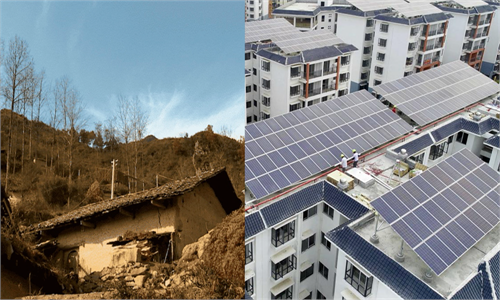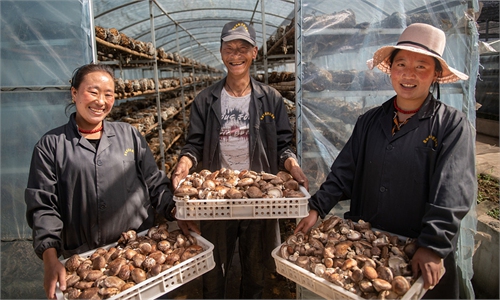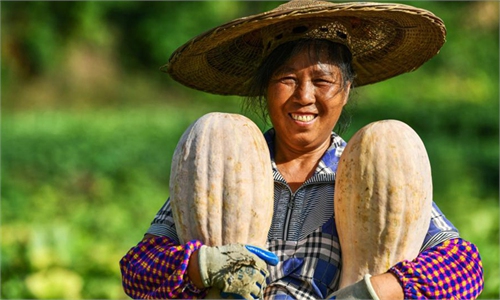Socialist system's advantages, CPC leadership key to China’s miraculous poverty alleviation success
Xi to honor contributors to poverty alleviation work
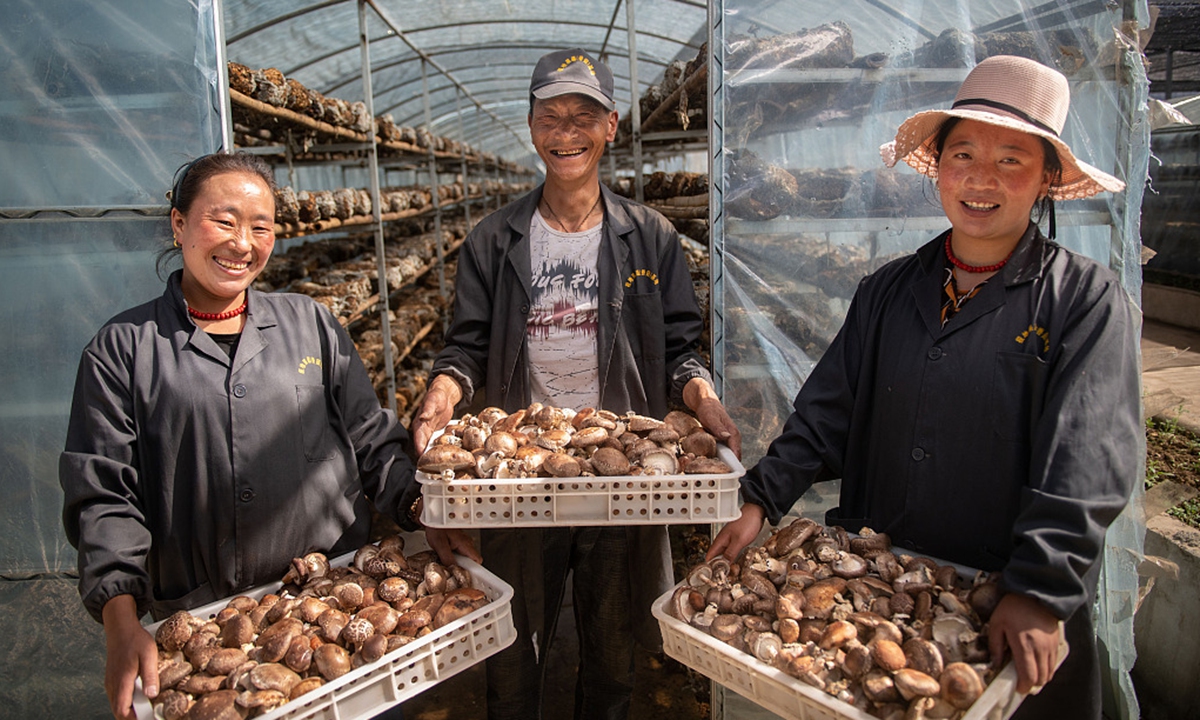
poverty alleviation Photo:VCG
The satellites around the Earth may have witnessed the great changes in China through the past eight years - the night of the country's vast western areas has been illuminated by more lights, the roads to remote and small villages have extended and bridges have been erected, new residential communities have appeared in livable areas and mountains and deserts are covered in green.
The reasons behind these changes are China's poverty alleviation work. In December 2020, the country - with the largest population in the world - announced it had lifted all rural poor people, under the current standard, out of extreme poverty, with 832 counties, 128,000 villages, and nearly 100 million poor people shaking off poverty.
"We should not forget the fact that China has contributed the most in world poverty alleviation in the past decade," UN Secretary-General Antonio Guterres said on China's poverty reduction achievements in 2017.
While praising what a great miracle China has made in human history, analysts said that the advantages of China's system - the strong and efficient leadership of the Communist Party of China (CPC), the capability to mobilize resources across the nation and the great contributions the Chinese people have made all contributed to the success of the country's poverty alleviation mission.
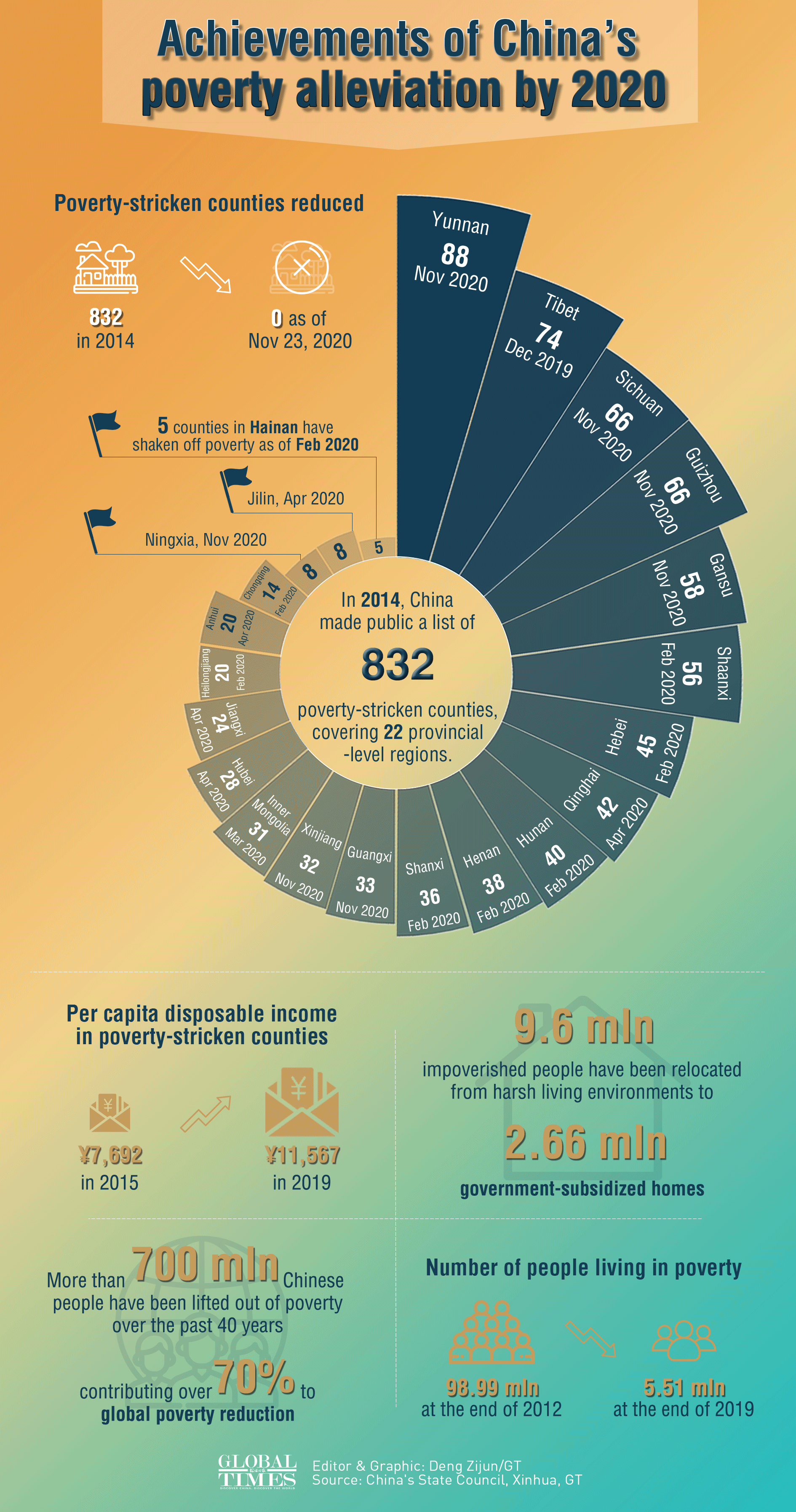
Achievements of China's poverty alleviation by 2020 Infographic: GT
Phased victory
On Thursday, Chinese President Xi Jinping is scheduled to deliver a speech at a national commendation conference at the Great Hall of the People in downtown Beijing to honor contributors to the country's poverty alleviation work.
Xi announced the accomplishment of poverty alleviation work in China while presiding over a meeting of the Standing Committee of the Political Bureau of the CPC Central Committee in December 2020, the Xinhua News Agency reported.
More than 1,980 individuals and over 1,500 collective units - organizations, institutions and companies - will be awarded on Thursday, according to a release from the State Council Leading Group Office of Poverty Alleviation and Development on February 10.
Xi, also general secretary of the CPC Central Committee and chairman of the Central Military Commission, will present awards and certificates to national honorary title recipients for their contributions to the country's poverty alleviation cause. Other role models in this regard will also be honored.
During the 13th Five-Year Plan (2016-20) period, the State Council Leading Group Office of Poverty Alleviation and Development awarded people who made special contributions to poverty alleviation every year. In 2020, the commendation conference was held in October, with 99 individuals and 49 collective units awarded.
This year's commendation conference - which will award the largest number of contributors, is held against the backdrop of China's accomplishment of lifting all rural poor people out of poverty, analysts said, noting that the conference marks the phased victory of the country's poverty alleviation work and it also hints that more efforts would be made to cement the achievements.
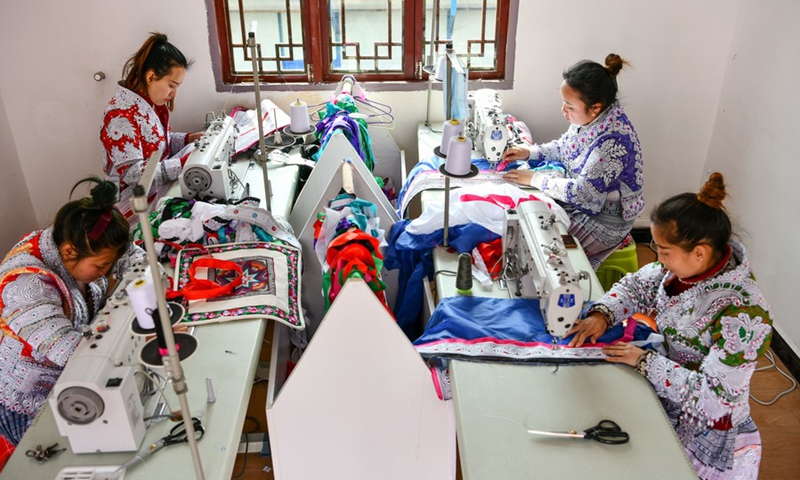
Yang Wenli (left) of Miao ethnic group makes Miao costumes with colleagues at a poverty-alleviation workshop in Huawu village, Qianxi county of Bijie, Southwest China's Guizhou Province. Photo: Xinhua
In just four months, the CPC - the party that leads the country with the biggest population in the world to make the miracle - will embrace the 100th anniversary of its founding.
"Completing the poverty alleviation work is a phased victory of China's Two Centennials, and it is also the starting point of the next 100 years. We need the commendation conference to draw experience from the past and also to encourage the Chinese to carry on the spirit to build our country," Xu Xing, a professor of politics at the Zhou Enlai School of Government of Nankai University, told the Global Times on Wednesday.
China's Two Centenaries refer to the 100th anniversaries of the founding of the CPC on July 1, 1921 and the 100th anniversary of the People's Republic of China on October 1, 1949.
A miracle made with system advantages
How has China accomplished this miracle in human history by successfully lifting 100 million impoverished people out of extreme poverty? What has it done in the past decade to realize the goal? Numerous stories on the poverty alleviation efforts in China's rural areas every day may shed light.
Zhang Houxue, a 43-year-old civil servant, volunteered to help combat poverty in the deep mountains of Southwest China's Guizhou Province two years ago. He was deployed to Daying village, Ziyun county in Guizhou and become the first Party secretary there.
Guizhou has a long history of impoverishment and was fighting China's most difficult poverty reduction battle. Daying village was deeply impoverished. About 44 percent of its households were stricken by poverty and people's basic livelihood could not be guaranteed. "We had to carry water from a valley 1 kilometer away. I never thought I could have tap water in my life," said one villager.
Without any industry other than traditional farming, Daying was known as an "empty village," because all the young people had left to find jobs elsewhere.
Zhang felt under great pressure when he first arrived.
Poverty-stricken households were not cooperative as Zhang had expected. "Even when we planned to build a new road that could improve their life, they were not very motivated." Zhang had to talk to the people, changing their mind and encouraging them to change their lives.
As a part of the poverty reduction campaign, the village imported a cattle range and improved its infrastructure. With joint efforts, all 56 households - a total of 208 people - have shaken off poverty in 2020. Ziyun is among China's last nine counties to have eliminated absolute poverty, which was announced on November 23, 2020.
Zhang's story is an epitome of how hundreds of thousands civil servants in China who were sent to rural areas have helped reduce poverty.
"Under the leadership of the CPC, numerous CPC members and grass-roots civil servants were mobilized to work in poverty-stricken rural areas - their contributions have ensured the accomplishment of poverty alleviation work," Cai Zhiqiang, a Beijing-based expert on Party building, told the Global Times on Wednesday.
The targeted policy to make developed regions and provinces in East China help its western regions is another valuable experience from the country's fight against poverty.
"Previously, the whole country supported coastal areas as they developed and then it is the turn of these regions to help the country's western regions. This shows that China has a top-level design for national development and its policies are consistently being implemented," Cai said.
The example of how a Shenzhen company helped with Taxkorgan Tajik autonomous county in Kashi Prefecture in southern Xinjiang Uygur Autonomous Region, chimes with Cai's remarks.
Hezhengyuan Dajiankang Tech Co, established in 2017, is an enterprise in processing agricultural products as well as import and export for the purpose of targeted poverty alleviation.
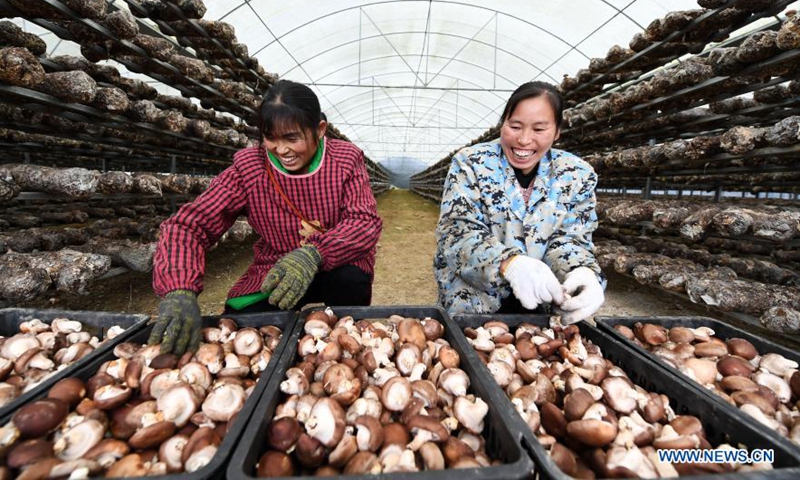
Villagers sort out just-harvested mushrooms at an edible fungus growing base at Minjiachang village, Minxiao township in Jiangkou county of Southwest China's Guizhou Province. Guizhou, which used to be a provincial-level region with the biggest population of poor people, has lifted more than 9 million people out of poverty since 2012. Photo: Xinhua
Since it was established, the company makes assisting Xinjiang by developing industries its foremost task and serves as a bridge between agricultural products in Xinjiang and market demand in Shenzhen, South China's Guangdong Province.
Its parent company, Shenzhen Hezhengyuan Group, has been contributing to Xinjiang's poverty alleviation task since about eight years ago when the Shenzhen government agency that is responsible for providing aid to Xinjiang introduced the company to Xinjiang for making yak products.
Chen Haiou, chairman of the group, told the Global Times on Wednesday that he spent most of his days over the past several years in Taxkorgan, which is some 5,500 kilometers away from Shenzhen and has become his second home.
"Sometimes, farmers talk with me about everyday trivialities and changes in life and sometimes they invite me to their homes. It all makes me feel at home," Chen said, noting that local residents' kindness to him is a result of their recognition of the company.
Since the launch of the company, it has established an operation mode of linking the government, enterprises, rural cooperatives and production bases, he said. "Apart from supplying local markets, the yak products are mainly shipped to Shenzhen by air," he said.
Before the company started, yak was sold 14 yuan ($2.17) per kilogram, but now the price has risen to about 25 yuan per kilogram because of the company's large-scale purchase of around 4,000 kilograms a month. "During the slack season between March and September, we can create about 30 jobs, while during the peak season, our whole industrial chain can offer 80 jobs," Chen said.
People's lives in the county have undergone enormous changes. "When I arrived in the county in about 2013, there were almost no home appliances, and some can be said to be utterly destitute. The environment was dirty and messy, there were no wide roads and some villages had no electricity and water supply," he said. But now these resources can all be ensured and there are also network facilities and lower-priced vehicles and driver training.
These "twin relationships" between eastern and western regions have greatly helped the underdeveloped areas with every field of society - individuals, government agencies and companies have been mobilized and engaged to offer not only financial support but also advanced technologies and talents.
In Northwest China's Xinjiang Uygur Autonomous Region, for example, in 2019, 19 provinces across China put nearly 18.82 billion yuan ($2.92 billion) and helped with 1,935 projects in Xinjiang and greatly improved local residents' livelihoods. Analysts said that this type of "twin relationships" are unique to China and show the country's willingness to walk into a better life with all of its people.
Sustainable development
Aside from mobilizing resources, especially talents, into poverty alleviation work, China has also paid great attention to building new infrastructure to link remote and poverty-stricken areas to the outside world.
The country has increased the power grid and internet coverage in western areas. Illuminated areas at night in these regions increased by 55 percent in the past five years and the length of roads within villages and countries increased by 64 percent within five years, according to data that Xinhua has released.
Improvements to basic infrastructure have helped industrial development, especially the internet economy, in recent years.
China has drawn its poverty alleviation patterns from past practices to see what worked and what did not. In the 1990s, China's poverty alleviation was more like that of some Western countries - by giving money or livelihood to impoverished people - but it soon turned into a pattern that encourages people to earn a better life by offering them favorable policies, Xu told the Global Times on Wednesday.
"By implementing targeted policies and nurturing industries to get poor people employed, China's poverty alleviation work becomes sustainable - it's like evolving from helping a patient through blood transfusions to enabling him to make blood through his own body," Xu said, refuting some Western media's claims that China's pattern is not sustainable.
The consistent policies to be firmly implemented and the capability to mobilize national resources and talents are China's system advantages, analysts said, noting that the great achievements in poverty alleviation may hardly be seen in capitalist countries.
"The political parties in the West represent the interests of capitalism, which makes it impossible for them to pay much attention to the interests of vulnerable groups. The changes of governments mean reversals in previous policies. The nature of capitalism to pursue profits also prohibits resources from being deployed to nonprofit areas, many of which are crucial to people's livelihoods," Cai said, noting that the recent Texas freeze and blackout in the US fully exposed the disadvantages of the West's systems.
Announcing the accomplishment of this poverty alleviation campaign is not the end of the work. China is now working to cement the achievements.
Yu Wei, director of the poverty alleviation office in Ziyun, told the Global Times on Wednesday that in Ziyun's case, the Aviation Industry Corporation of China has been aiding Ziyun, bringing finance, talents, administrative expertise and more importantly the market to the county.
Though victory has been declared in the battle against extreme poverty, Zhang's and Yu's task is not complete. Zhang and others deployed to villages across China will stay where they are to ensure that no household slips back into poverty and to continue to promote rural revitalization.
According to Zhang, supervision mechanism to monitor and stop people from falling back into poverty will be set up. More investment will be put into new infrastructure. Local regions will maintain the current industries and projects to increase incomes.
"We have never stopped our work and celebrated. We still have a long way to go," Yu said.
"China has made a miracle in human history of fighting poverty. It not only turned common prosperity into reality but also offers China's experience and patterns to countries across the globe which are still fighting poverty," Cai told the Global Times on Wednesday.
Lifting 100 million poor Chinese people from extreme poverty to enjoy a better life also sets an example for the world in paying more attention to impoverished people, Cai said, noting that although humans have entered the modern era, millions of people are still living below the internationally recognized poverty line.
"It is humanity's shared responsibility to help these people," the expert said.
Analysts noted that with the large number of Chinese climbing out of poverty and becoming wealthier, greater economic vitality in China will be a driver of the global economy.
China's full-fledged poverty reduction campaign created a world miracle which has not only benefited millions of Chinese people, but also exerted a positive influence on other developing countries, as many have either received support or taken reference from China's successful practices.
